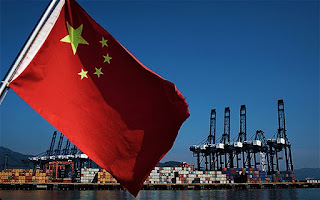The second largest economy in the world gives signs of exhaustion of the expansive capacity, while its financial system reveals inadequacies and limitations of an underdeveloped economy. A combination that has already taken the first evidence of the adverse consequences it may have on global financial stability and growth of the world economy.
For over two decades, the Chinese economy grew at rates of around 10% a year and now accounts for 15% of the value of world output of goods and services. In recent years, its expansion has meant half of global growth, becoming the real engine of the global economy, since after emerging economies exporting commodities, but also from other exporting economies such as Germany. Savings surplus, foreign exchange reserves exceeding 3.6 billion, consistent with the continued surplus in the current account of the balance of payments, became an investor power, accumulating financial assets around the world: from the financing a significant part of the US public debt to the realization of important direct investment in developed or emerging economies producing commodities.
Your recent slowdown is evident. Manufacturing output has shrunk and the competitiveness of their exports. It will not be easy to overcome the 7% growth this year, and thus ensure the reduction of poverty and social stability needed, until now protected by a continuous generation of income, although manifestly unequal, facilitating the intensity of population movements from the countryside to the city. The extraordinary increase in inequality in the distribution of income and wealth will from now a senior at the normalization of the functioning of the economy, the movement of the role of investment by the private consumption obstacle. This is also necessary for the entire global economy, the eurozone course, reduce the threats to the continuity of the recovery condition.
Faced with such a scenario, the authorities give the impression of being overcome by the combination of those records with financial stress slower growth in their markets. Concern that offers this combination is compounded by the high and not at all known public and private debt accumulated over the years and the expansion of a financial system institutionally slurred, with an extension of the so-called "shadow banking" and a growing erosion of the confidence of economic, foreign and domestic on the ability to redirect the situation agents. A significant portion of private debt has been captured for investment in equity markets manipulated, closer to a casino that efficient allocation mechanisms.
The successive devaluations of the yuan or conflicting decisions on stock exchange transactions are the main exponents of that confusion in economic policy. The recent adoption of additional measures to stimulate economic activity and the reduction of interest rates by 0.25 points to 4.6%, or the ratio of bank reserves will not be enough to restore the perception of depletion model. Increased transparency and concrete plans for reform of economic and financial institutions are the signs that the return of confidence required.








0 komentar:
Post a Comment